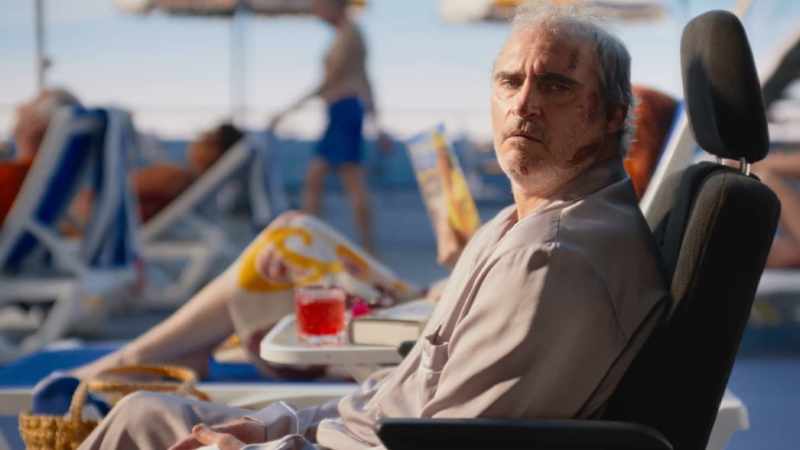




Beau (Phoenix) lives in a world completely beholden to his phobias and paranoias, the all-consuming potential of threat from everything looms large, crippling all aspects of his life. As he deliberates to his therapist of his upcoming visit to his mother (Patti La Pone), there’s an inclination from the get-go, being an Ari Aster film after all, that what would otherwise be a simple outing will likely take on dramatic and agonising proportions.
The forces of nature align to purposefully conspire against Beau, hellbent on materialising every single one of his fears. The world is cruel, unnecessarily at times, with aggressive neighbours, people mugging him, his house being ram shackled by squatters, getting run over, being shot at, to his very existence being scolded viciously by his own mother. Beau traverses from one frenzied incoherent calamity to the next, each event linked to each other piecing together an elaborate, aesthetically rich if menacing voyage into psychosis where plot strands verge into the unreal and Aster is disinclined to offer any reality clues whatsoever.
Beau’ story of psychological turmoil dates to before he was even born; his dad died of a heart attack whilst impregnating his mother. There was even a reluctancy from him to come out of the womb – subjective opening scenes of him being born have him hesitant to even cry. It’s a diffidence that permeates his whole life which we get to see snippets, in various forms of storytelling, aiming to envisage for us Beau’s trauma, rationalise his high levels of anxiety and chronic depression. Scenes of him as a pensive and reserved child at the hands of an over-achieving domineering maternal figure, a futile childhood romance on a cruise holiday, also veering into metaphysical parallel unlikely futures, where Beau is married and has three sons. But the dominant story lies with adult Beau, a sad sack of a man in his uncharacteristic, barely furnished apartment, numbed on antidepressants, watching day-time TV, and reading self-help books.

Phoenix is completely stripped back here to reveal what he would look like as an average, unkempt middle-aged man. His physicality is on show throughout, we see a lot of nakedness where flashes of his enlarged testicles signal to Beau’s phobia of ejaculation, which surprisingly finds respite in the film’s denouement. Years of pent up cum are released when he is reunited and mounted by his persistent childhood sweetheart, Elaine (Parker Posey), who Beau still holds a torch for. This moment of elation is predictably short, rudely interrupted by the realisation that Elaine has died and rigor-mortis-ed in the process whilst still sitting on him and then to discover his disapproving mother is there watching and ready to have words.
Through all this its Beau’s reaction that proves most jarring, surpassing the anxiety-inducing sensations of the unhinged and fraught journey we join him on. He remains pathetically passive. You never warm to him or even pity him, when he constantly opts for the wrong choice or utters the wrong words seeking to always make matters worse for him, becoming equally infuriating to the viewer as he is to the supporting cast in this film.
Yet it’s in this anxious space where Beau Is Afraid merit lies, in the way that it introduces a different type of horror. A horror that forces you to unwarily take it all in, mesmerise at the visual feast before you, similarly riveted and repulsed by it, questioning everything you are watching, pondering where it’s all going to lead, in the gradual knowledge that you will never find out.
Beau is Afraid is in cinemas on Friday, May 19th.
















